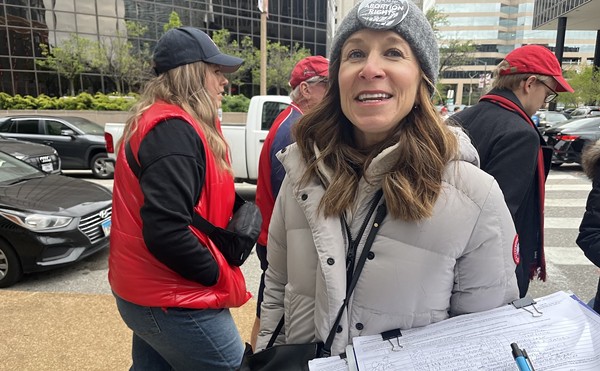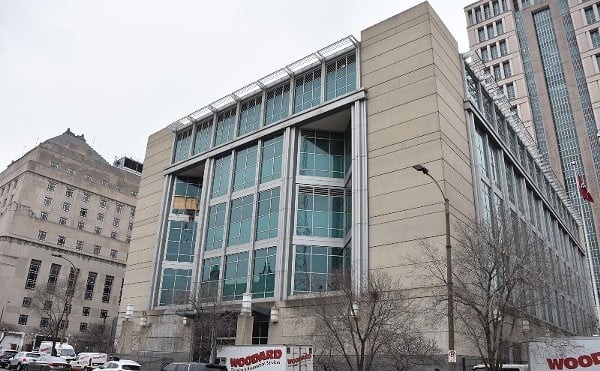On the "Commentary" by Ray Hartmann in the May 24 issue concerning expanding MetroLink ("St. Louisans, Start Your Engines"), many of us in far West County don't support a tax increase to fund MetroLink expansion because there is no plan to expand it in this direction. Unless we see some signs of this, we would rather our money go toward improving our highways to accommodate the huge amount of traffic we are currently experiencing.
M. McMindes
In your article on mass transit, you cite MetroLink's 40,000 daily passengers as a success. Did you actually see daily statistics, or did you take the word of someone at Bi-State? I have a suspicion that that figure, if true, is an average including all passengers, including special events.
That is not what the East-West Gateway Coordinating Council's final environmental-impact statement of September 1987 based its ridership prediction on as a selling point.
That report predicted 74,254 daily fares, exclusive of special events, and indicated this was a "break-even" point of operation.
You still think MetroLink is a success? You know as well as I that as long as highways (federal, state and county) are built and improved, no one will abandon their car. Compared with other major cities, our time at rush hour is something they would envy.
Bill Bandle
COURT-ING DISASTER
The article on collecting back child support by jailing parents ("No Way Out," RFT, May 24) was an important first step in showing the process we now have for dealing with the "deadbeat parent" problem. Unfortunately, Bruce Eastman's statement that the press would probably not have been interested in the Huddleston case if it was the father and not the mother in jail for nonpayment is far too accurate. Even if the press is, the public is not. More's the pity.
I have worked in cases side by side with both attorneys in the Huddleston case, Kimber Baro and Marie Kenyon. Both of them are extraordinarily talented, hardworking single parents who typically represent people who can afford to pay very little or nothing in attorney fees with zeal. By focusing on the personalities in the case, the RFT avoided the bigger picture of what is going on in jailing people for nonpayment. By focusing on the parties doing so, you missed the broader political side of the policies.
I would venture to say the majority of those thrown in jail are there because of local prosecutors and most of those doing time are men. The same logic pointed out in the article -- coercing payment -- underlies most of these prosecutions. While prosecutors are certainly interested in getting money to kids, they are elected officials who have to be concerned about being portrayed as "soft" on that singularly horrible modern phenomenon of the "deadbeat dad." A deadbeat dad is probably almost as low in public esteem as crack dealers or even, yes, lawyers. But I'm not talking about the headline-winners like millionaires who refuse to pay because they don't like the kid's haircut. I mean the guy who has marketable skills, lost his great-paying union job and now cannot find work for more than half of what he used to make -- and what his support payment is based on. The public makes no distinction for this person, so the law sometimes doesn't, either.
A broke parent cannot easily hire an attorney to attempt to lower their support obligations. So without an order modifying the support, the default gets worse. As the support arrearage grows, they have even more trouble doing so even if they work, since the garnishment on whatever wages they have consumes so much they may not be able to pay their own rent. Then they face the wrath of the prosecutor, whose overworked staff may have to operate from statistics which trigger arrest warrants based on dollars more often than circumstances. One can imagine the impact on one's job when the gentle forces of law and order appear at their job site to take this parent into custody. What are the odds of that big promotion then? And now the broke parent is sitting in jail, unable to afford an attorney, unable to pay much if anything, possibly now out of work if they had a job in the first place, and hoping that the prosecutor or judge will exercise some discretion in determining whether to work something out.
The problem is not the people in the system but the system itself. We have a political environment where few explanations are sufficient to justify being behind on support payments and the public is far too easily swayed by simplistic calls to "get tough with deadbeat dads" in the Legislature. So we end up with sometimes draconian laws based on the absolutely best of intentions. We have prosecutors who would dearly like to enforce the law with humanity but know that being humane can lose elections, judges who are often hamstrung by the laws they must execute and underfunded public defenders and legal-aid offices unable to step into the breach. Until the public chooses to abandon its indifference and understand this is a complex social issue and not a simplistic legal one, we will continue to have poor parents treated as criminals no matter what their good intentions are toward their children, and that is the real injustice.
Wendell J. Sherk
The story done by Laura Higgins was excellent. A great piece of journalism by Ms. Higgins and the RFT. Jane Aiken says that Wendy Huddleston's case is like none she's ever seen, probably because in this case the person paying child support is a woman.
That fact does not surprise me, as a man who has started a men's organization dealing in men's discrimination issues and made that one of my four campaign issues running as a Libertarian candidate for state representative.
Ms. Huddleston says her ex-husband was abusive. If that were the case, why did she plead with him to stop the divorce proceeding? Though Mr. Huddleston denies the allegation, he very well may have been abusive, but so was Ms. Huddleston, probably. We should not presume that one person is right or wrong in divorces because that issue is a "he said, she said, or did, etc."
Bruce Hilton says, "It's a Catch-22". My thoughts are with him. "If you don't have any money, you can't pay child support, but how are you going to pay if you're in jail?" It would be nice if Laura Higgins and the RFT would do some stories about men who have "No Way Out" either. It also doesn't surprise me that Joseph Church donated $600 to get Ms. Huddleston out of jail. Maybe someone kind enough like Mr. Church would donate the back child support owed to Mr. Huddleston.
From personal experience and as Mr. Huddleston stated, we both know that few people, like myself, would be nice enough to help him. I would highly suggest that Mr. Huddleston be nice to both his two children and his former wife. Like the saying, what goes around, comes around. And from me personally to Wendy Huddleston, good luck, and I wish you well.
Mike Chestnut
Thank you for the article last week, and thanks especially for highlighting the incredible work of Marie Kenyon, the staff attorney for the Catholic Legal Assistance Ministry (CLAM).
As the article was not focused on Marie Kenyon but rather on the terrifying plight of Wendy Huddleston, you cannot be faulted for only highlighting Ms. Kenyon's work. As the director of the Human Rights Office of the Archdiocese of St. Louis, the agency that supervises and administers CLAM through a generous grant from the Archdiocesan Development Appeal, please allow me to give a few more details about Marie Kenyon.
Marie Kenyon is a graduate of the St. Louis University School of Law who has tirelessly, from day one after passage of the Missouri bar, served lower-income families and individuals. Her work impacts literally hundreds of people each week. She serves as a policy consultant to this office and to our Welfare Reform Working Group. She is an organizer of Mothers and Children Together, an effort to help children stay connected to their mothers during incarceration. She also serves as an at-large member of the board of governors of the Bar Association of Missouri-St. Louis.
On top of all of this, she is a joy to be around and the mother of two amazing children. There are heroes in our community, and Marie is one of them.
Edward R. Martin Jr.
Director
Human Rights Office
Archdiocese of St. Louis





